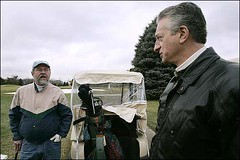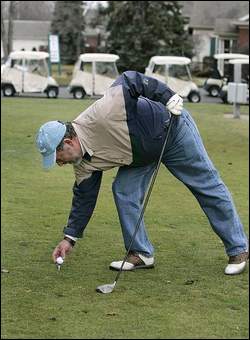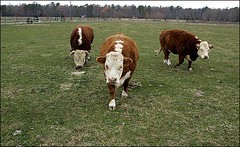Speaking of sprawl
 Brandy Baker / The Detroit News. Tom Hall, left, chats with Sycamore Hills Golf Club owner Tom Schwark. Nine of the Macomb Township course's holes will help accommodate houses, one of several such projects attributed to a glut of links and skyrocketing land prices.
Brandy Baker / The Detroit News. Tom Hall, left, chats with Sycamore Hills Golf Club owner Tom Schwark. Nine of the Macomb Township course's holes will help accommodate houses, one of several such projects attributed to a glut of links and skyrocketing land prices.Today's Detroit News has two interesting articles. The first, "Developers find links fertile building grounds: Housing projects have begun at three golf sites and recent closures make others possible in north Macomb," discusses how golf courses are being converted in housing developments because of tremendous demand, and lack of available developable land. I am not really into golf, although I am fine with green spaces, and I rue their loss. I do find this ironic though given the availability of about 55 square miles of cleared land in Detroit, which is about 7-12 miles away from the developments discussed in the article. Can we say urban growth boundaries and green space protections?
From the article:
Projects are under way on three courses, Sycamore Hills Golf Club, Hickory Hollow Golf Club and Moravian Hills Country Club. Some of Sycamore Hills, off North Avenue between 21 Mile and 22 Mile in Macomb Township, will remain. Eighteen holes of the 27-hole course will stay after a large housing development is built on Sycamore Hills and the adjacent Hickory Hollow this year. A portion of the neighboring Macomb Township courses -- combined at an estimated 335 acres -- will be developed into roughly 400 single-family homes, condos and duplexes, said Sycamore Hills owner Tom Schwark....
Several Macomb County courses are being redeveloped as the land value skyrockets and as more courses are built elsewhere, causing a stir of competition in the golf industry, said Schwark, who is also a past president of the Michigan Golf Club Owners Association. "The supply increased, but not the demand," he said.
For the past 33 years, Tom Hall has tried to get away when he can to hit a few holes at Sycamore Hills. He's relieved that part of the course will remain. Hall, 58, of Macomb Township doesn't mind the housing boom "as long as they don't sacrifice the (Sycamore Hills) golf course. It's one of the nicest courses around.
 Tom Hall. Detroit News photo.
Tom Hall. Detroit News photo.The other article is an AP story, "Mini cattle turn home owners into ranchers: Pint-sized heifers, bulls give small farmers with less room chance to raise cattle for sale, meat or just fun," about the rise of suburban "ranchettes," in places like Maryland.
This is the first article that has probably convinced me that suburban (or exurban) living can offer things that city living doesn't. People leave the city because of the quality of schools or because of crime, but the city would be better off if people stayed and worked to make the schools better and the streets safer. These days, you're never going to be able to have a heifer in your back yard in the city, even if you live in a place that once used to be farms--although some long time residents in the H Street neighborhood do remember when Gallaudet College had cows grazing there, because at the time the College produced its own milk.
 Chris Gardner / Associated Press. Mini heifers and a bull feed in a field on Bill Bryan's 50 acre spread in Trappe, Md. If you're a suburban cowboy hankering to raise a herd and short on ranchland, mini cattle may be for you.
Chris Gardner / Associated Press. Mini heifers and a bull feed in a field on Bill Bryan's 50 acre spread in Trappe, Md. If you're a suburban cowboy hankering to raise a herd and short on ranchland, mini cattle may be for you.From the article: "Miniature cattle are sold for use as pets, for small-scale milk production, breeding, showing, organic beef production or for the farm-grown market. In Felton, Del., Charles Warren said his five cows and one bull are a hobby. "They're like a pet more than anything. I like them because they're neat looking, they're oddities," Warren said."
Index Keywords: sprawl



0 Comments:
Post a Comment
<< Home